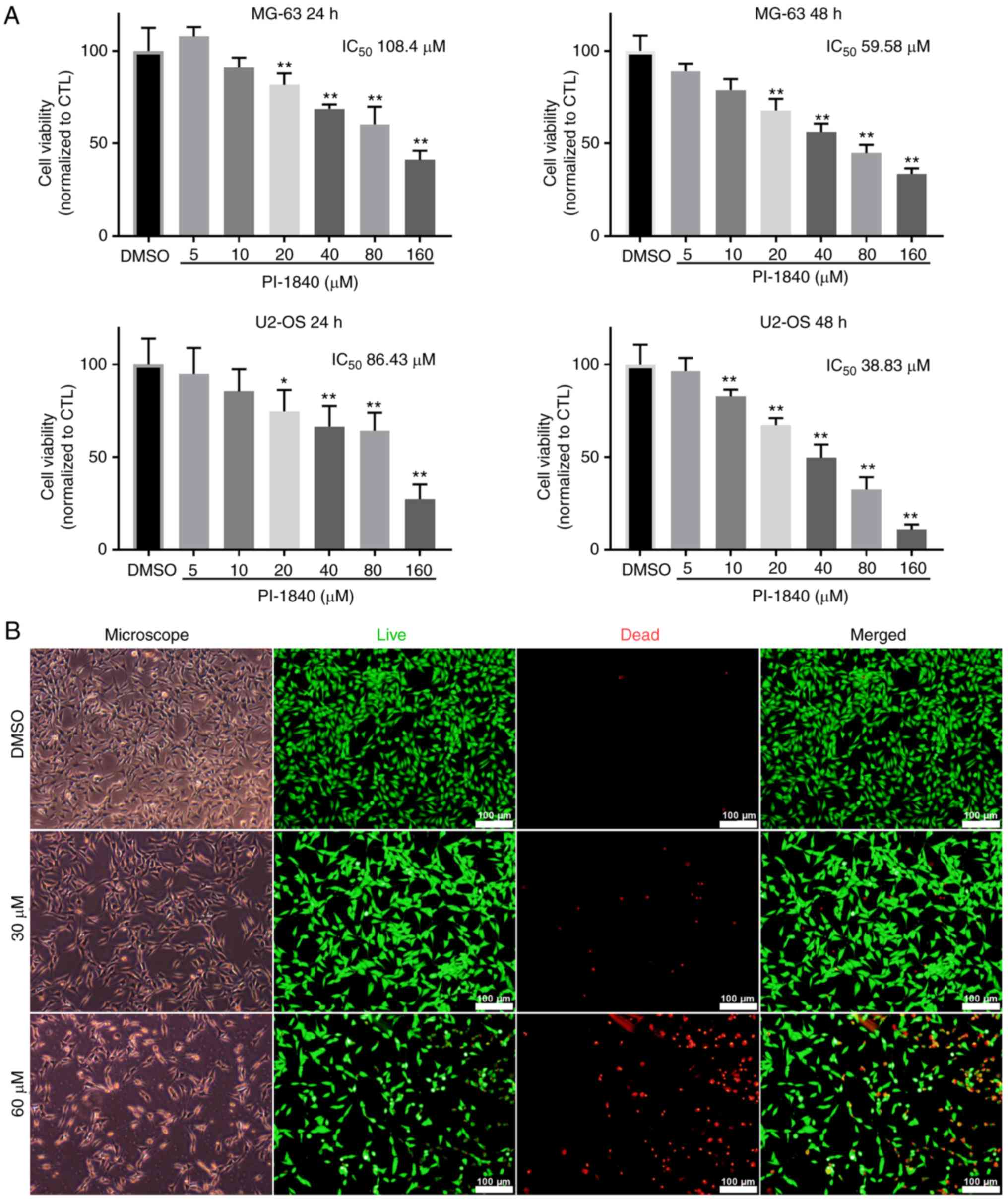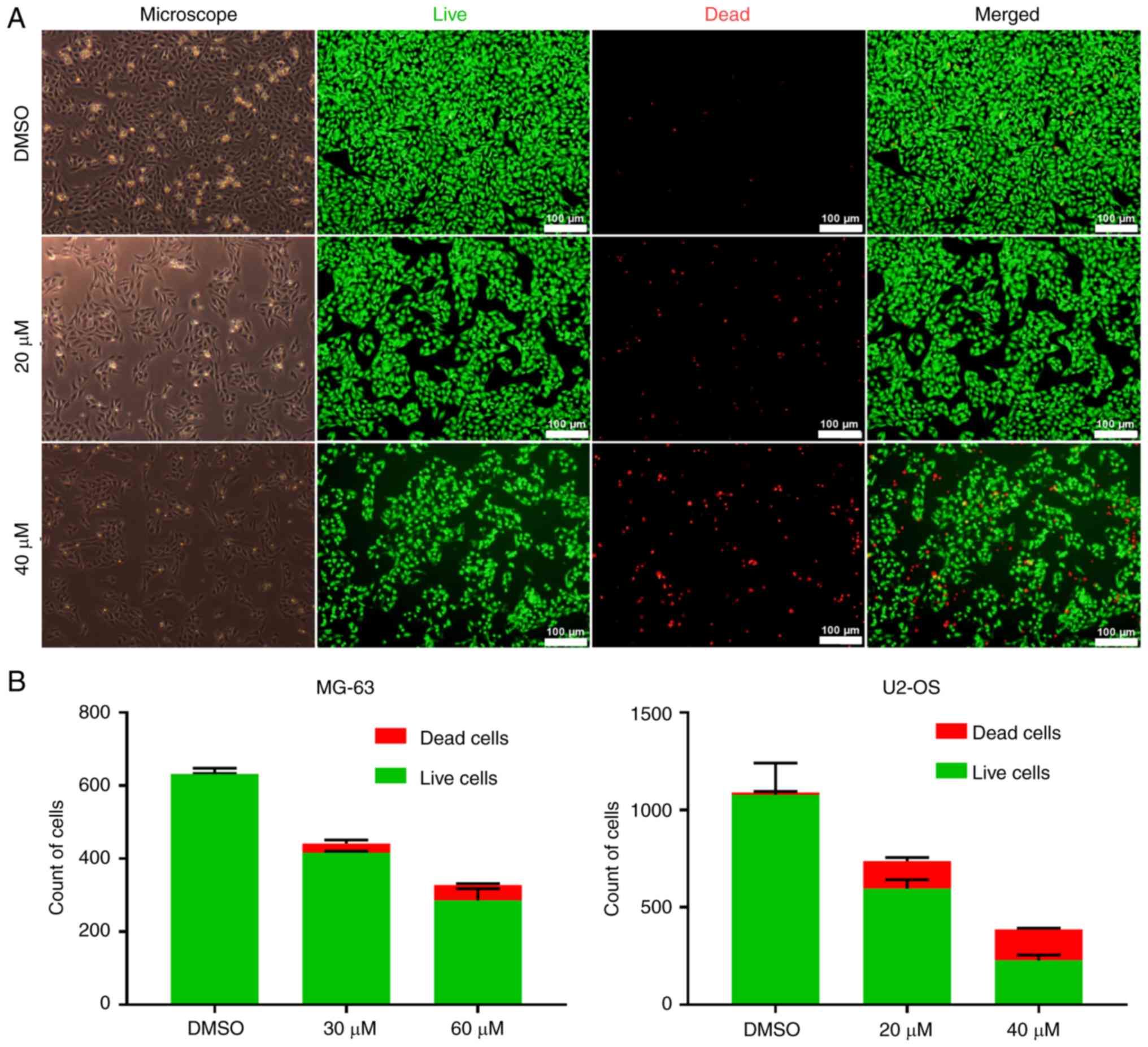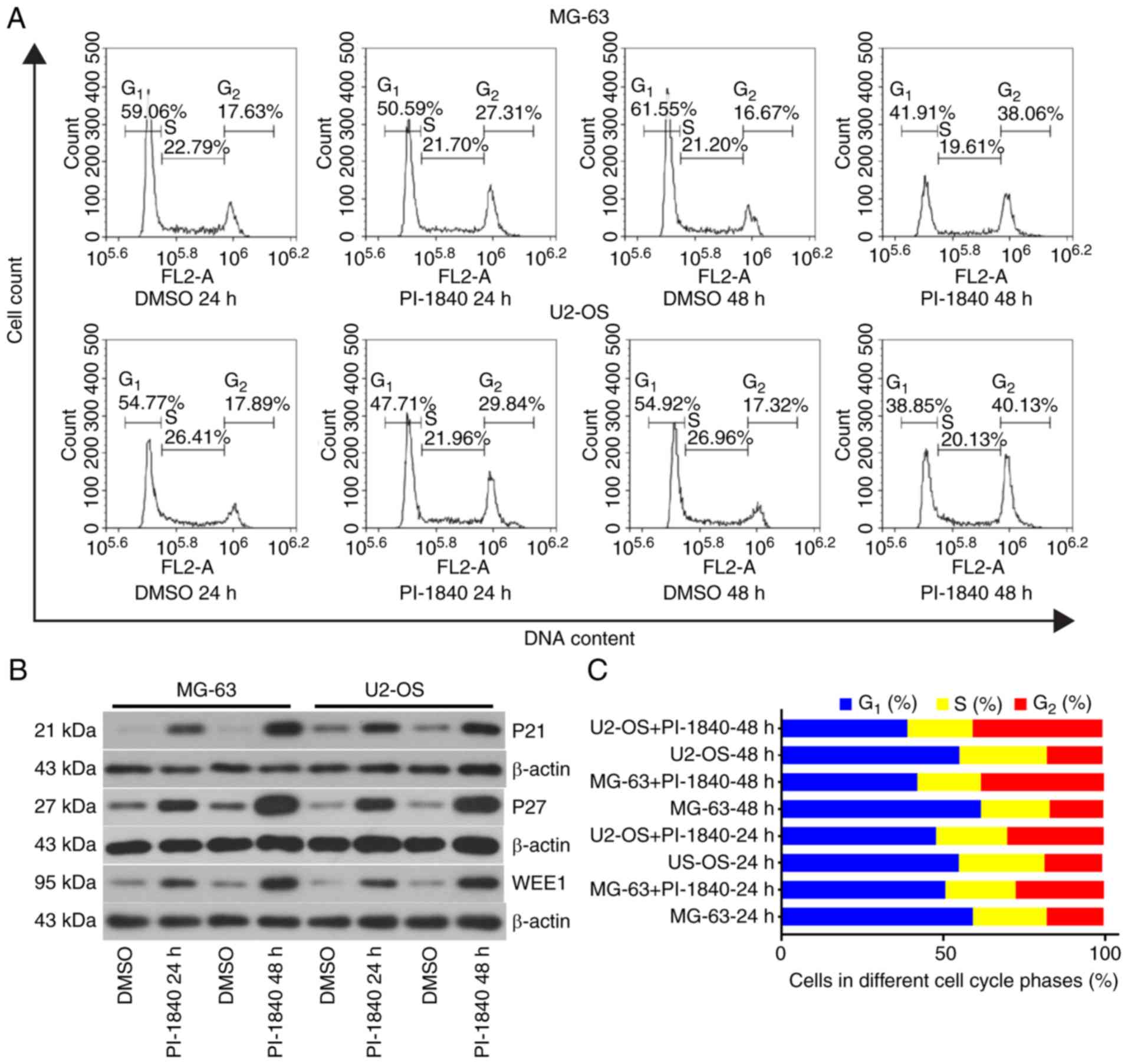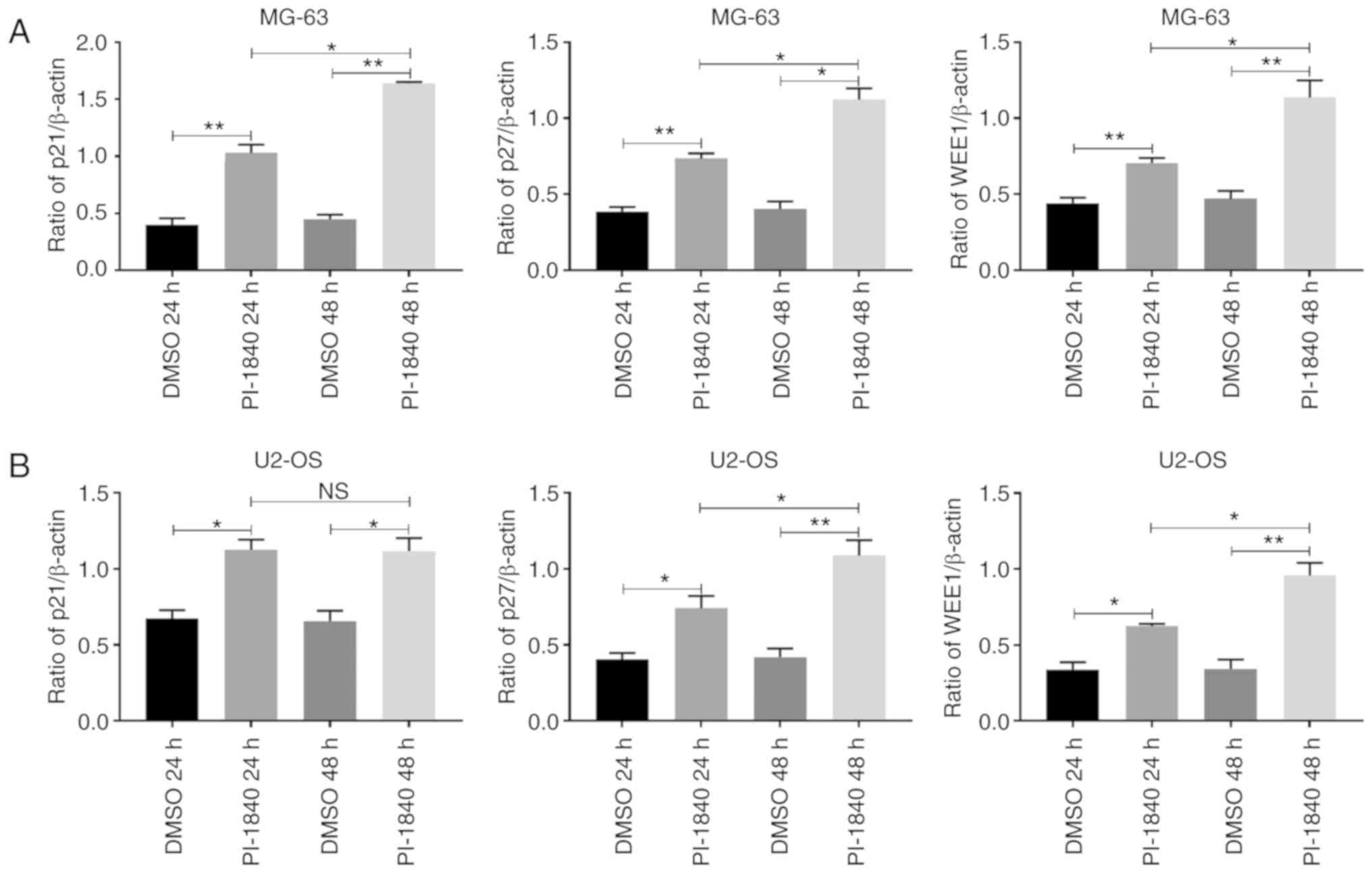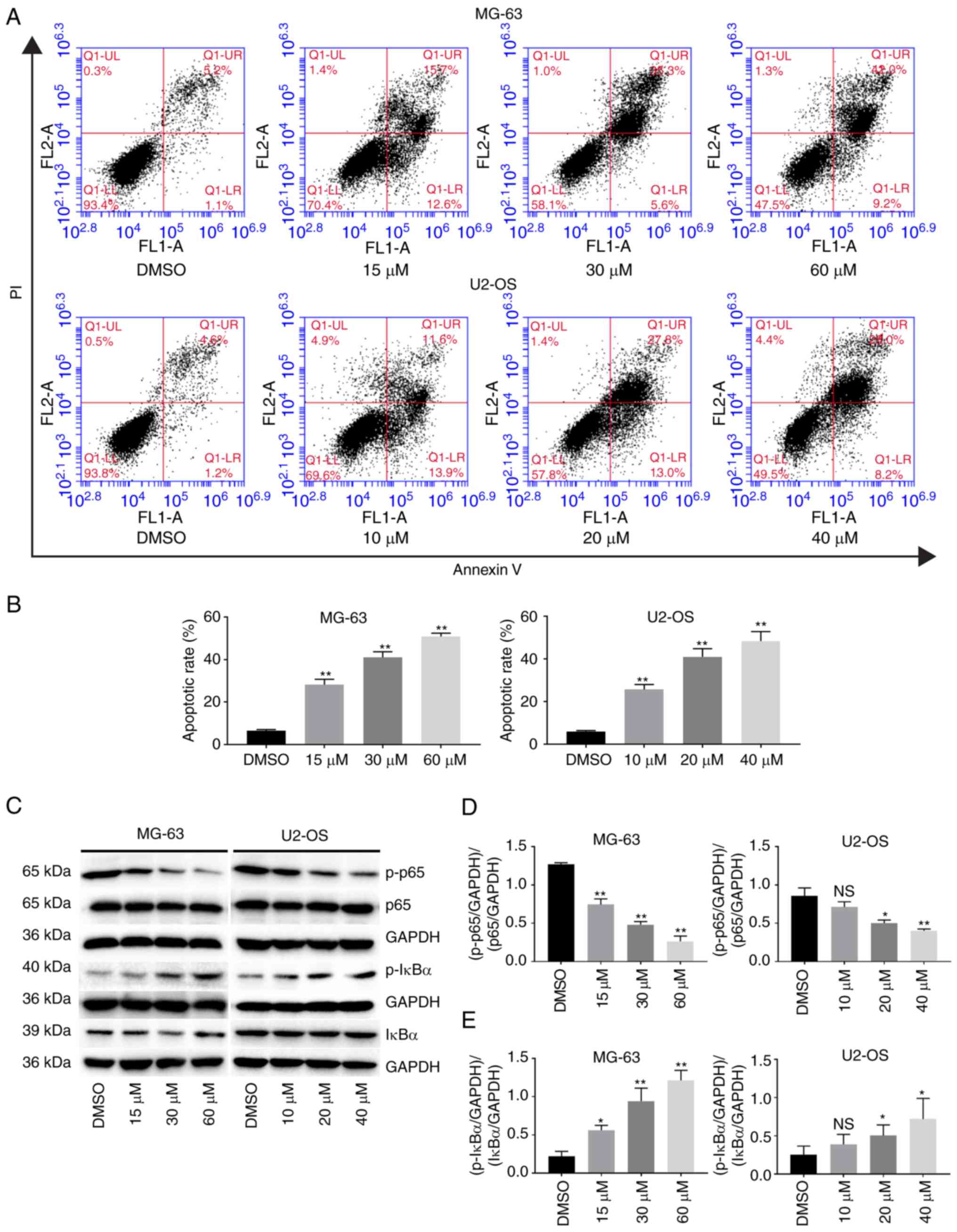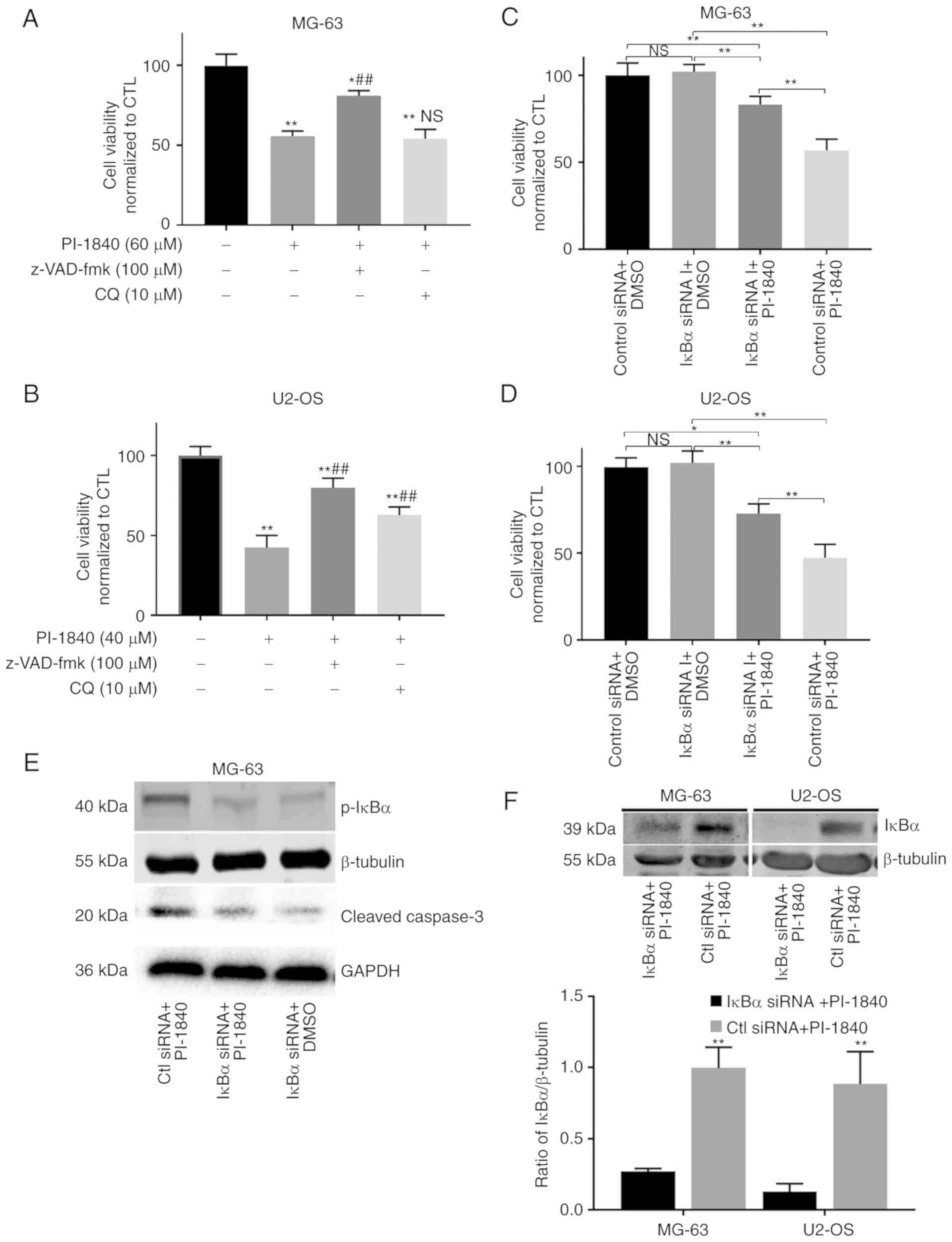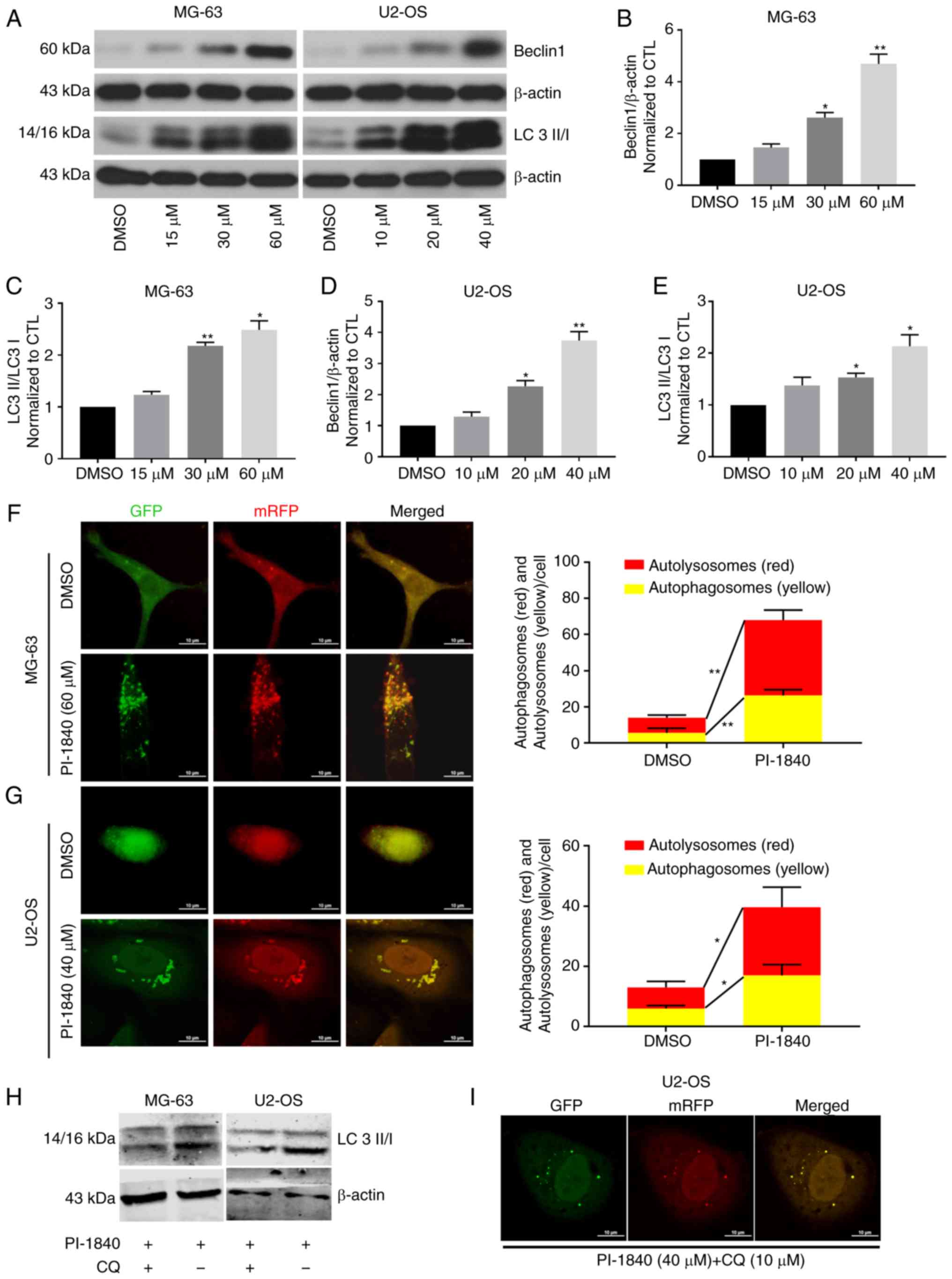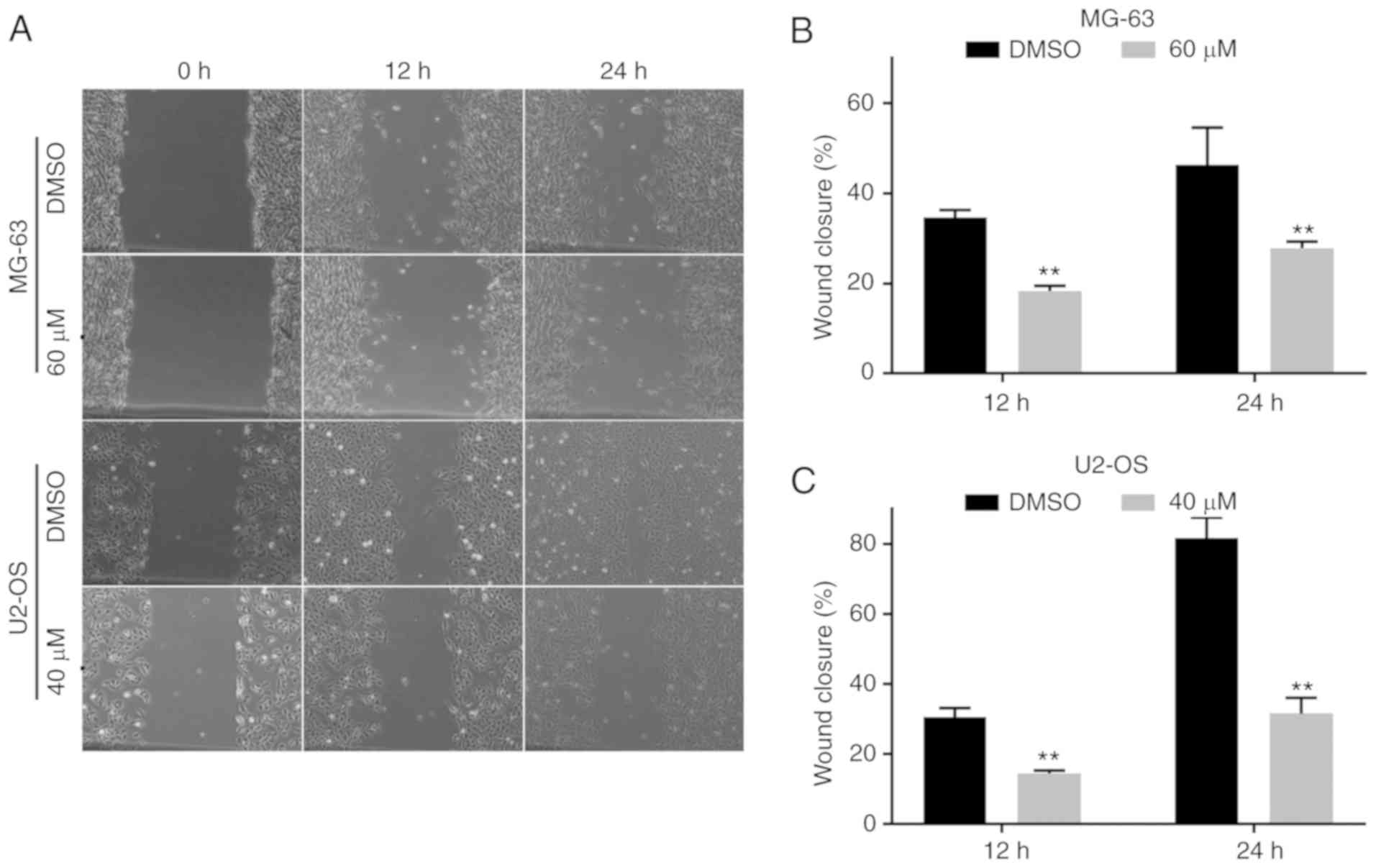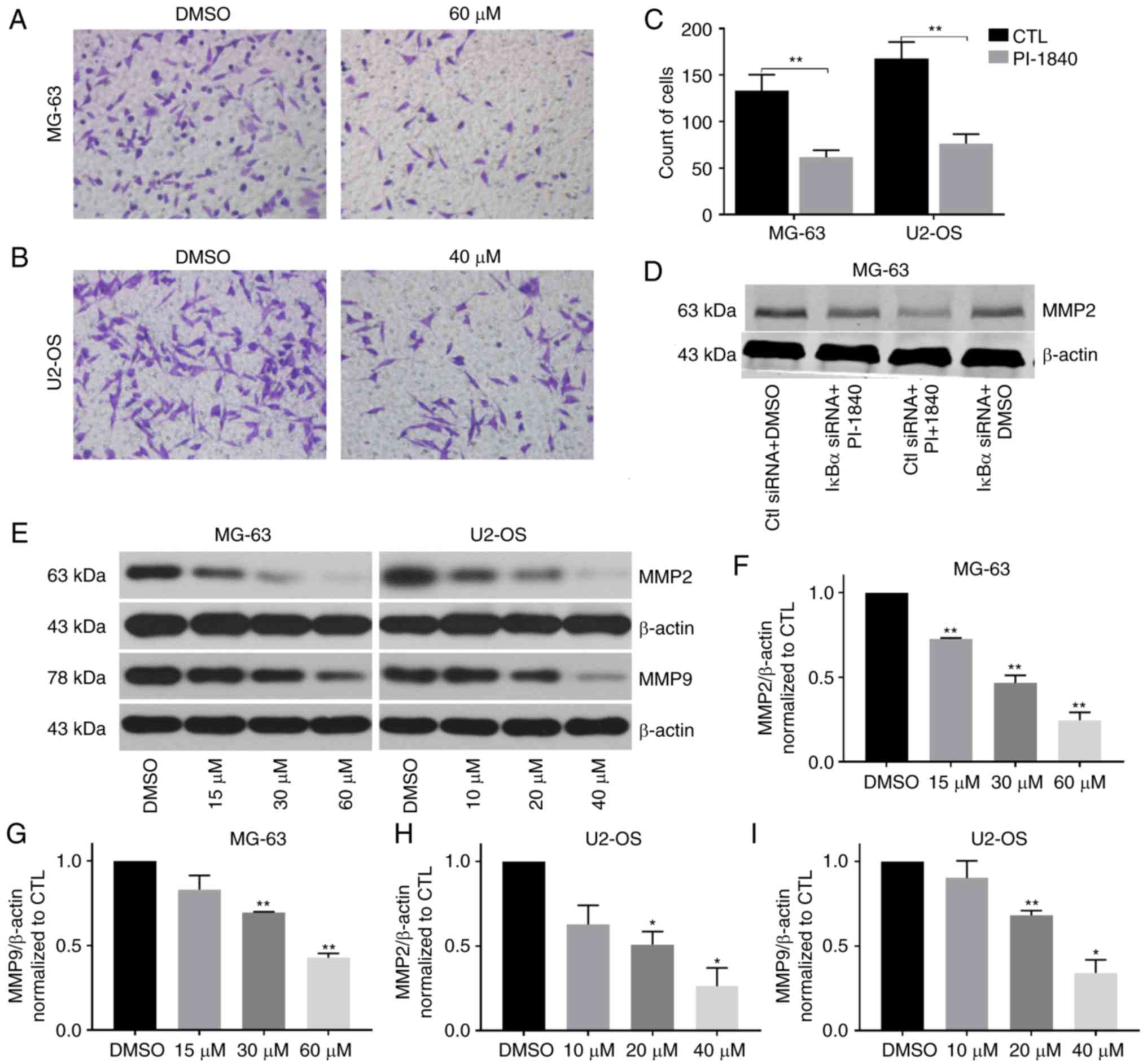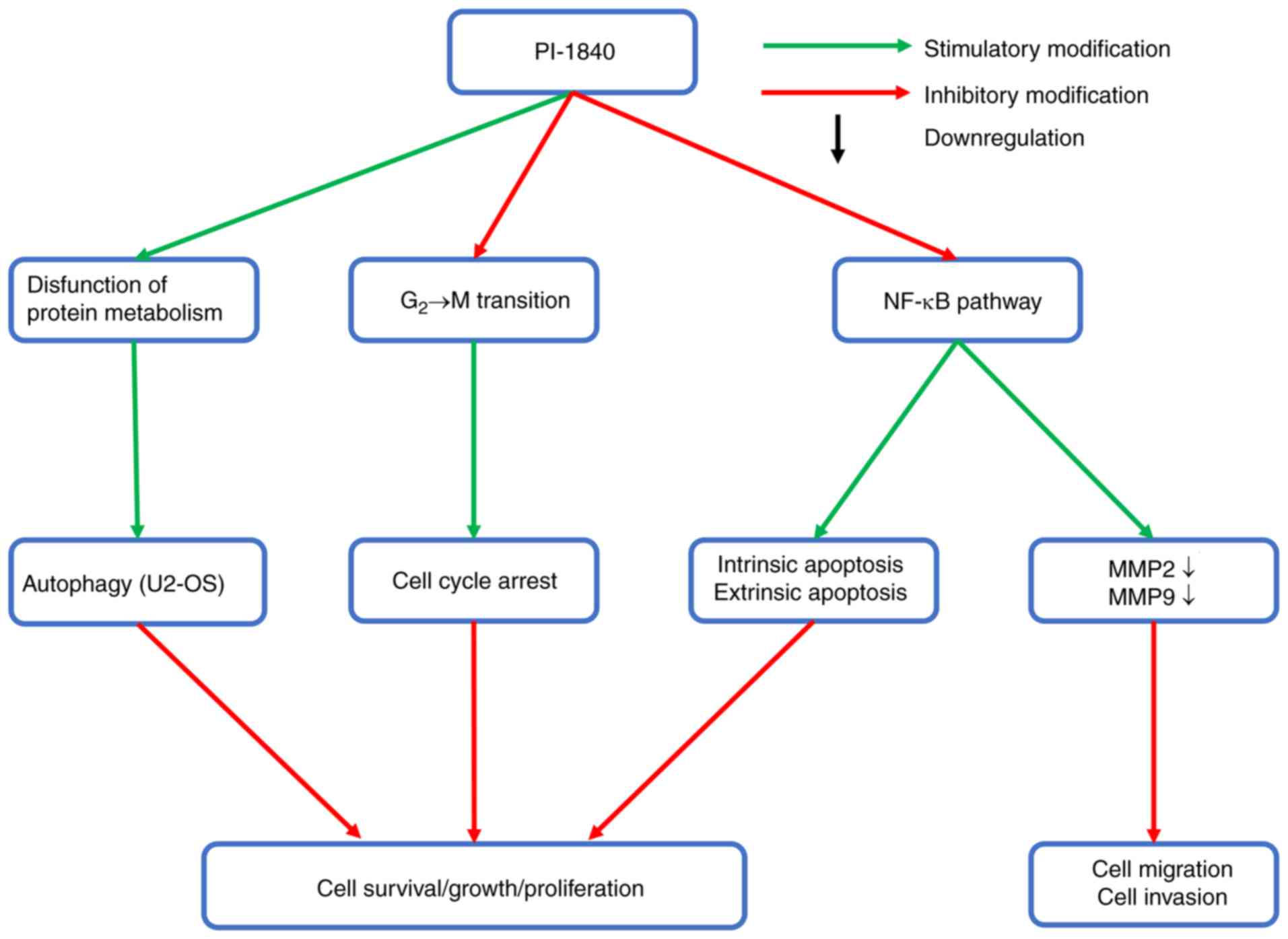|
1
|
Bielack SS, Kempf-Bielack B, Delling G,
Exner GU, Flege S, Helmke K, Kotz R, Salzer-Kuntschik M, Werner M,
Winkelmann W, et al: Prognostic factors in high-grade osteosarcoma
of the extremities or trunk: An analysis of 1,702 patients treated
on neoadjuvant cooperative osteosarcoma study group protocols. J
Clin Oncol. 20:776–790. 2002. View Article : Google Scholar : PubMed/NCBI
|
|
2
|
Harrison DJ, Geller DS, Gill JD, Lewis VO
and Gorlick R: Current and future therapeutic approaches for
osteosarcoma. Expert Rev Anticancer Ther. 18:39–50. 2018.
View Article : Google Scholar : PubMed/NCBI
|
|
3
|
Isakoff MS, Bielack SS, Meltzer P and
Gorlick R: Osteosarcoma: Current treatment and a collaborative
pathway to success. J Clin Oncol. 33:3029–3035. 2015. View Article : Google Scholar : PubMed/NCBI
|
|
4
|
Smith MA, Seibel NL, Altekruse SF, Ries
LA, Melbert DL, O'Leary M, Smith FO and Reaman GH: Outcomes for
children and adolescents with cancer: Challenges for the
twenty-first century. J Clin Oncol. 28:2625–2634. 2010. View Article : Google Scholar : PubMed/NCBI
|
|
5
|
Yamamoto N and Tsuchiya H: Chemotherapy
for osteosarcoma-where does it come from? What is it? Where is it
going? Expert Opin Pharmacother. 14:2183–2193. 2013.PubMed/NCBI
|
|
6
|
Chen L and Madura K: Increased proteasome
activity, ubiquitin-conjugating enzymes, and eEF1A translation
factor detected in breast cancer tissue. Cancer Res. 65:5599–5606.
2005. View Article : Google Scholar : PubMed/NCBI
|
|
7
|
Cenci S, Oliva L, Cerruti F, Milan E,
Bianchi G, Raule M, Mezghrani A, Pasqualetto E, Sitia R and Cascio
P: Pivotal advance: Protein synthesis modulates responsiveness of
differentiating and malignant plasma cells to proteasome
inhibitors. J Leukoc Biol. 92:921–931. 2012. View Article : Google Scholar : PubMed/NCBI
|
|
8
|
Voutsadakis IA: Proteasome expression and
activity in cancer and cancer stem cells. Tumor Biol.
39:10104283176922482017. View Article : Google Scholar
|
|
9
|
Teicher BA and Tomaszewski JE: Proteasome
inhibitors. Biochem Pharmacol. 96:1–9. 2015. View Article : Google Scholar : PubMed/NCBI
|
|
10
|
Moreau P, Masszi T, Grzasko N, Bahlis NJ,
Hansson M, Pour L, Sandhu I, Ganly P, Baker BW, Jackson SR, et al:
Oral ixazomib, lenalidomide, and dexamethasone for multiple
myeloma. N Engl J Med. 374:1621–1634. 2016. View Article : Google Scholar : PubMed/NCBI
|
|
11
|
Palumbo A, Chanan-Khan A, Weisel K, Nooka
AK, Masszi T, Beksac M, Spicka I, Hungria V, Munder M, Mateos MV,
et al: Daratumumab, bortezomib, and dexamethasone for multiple
myeloma. N Engl J Med. 375:754–766. 2016. View Article : Google Scholar : PubMed/NCBI
|
|
12
|
McBride A, Klaus JO and Stockerl-Goldstein
K: Carfilzomib: A second-generation proteasome inhibitor for the
treatment of multiple myeloma. Am J Heal Pharm. 72:353–360. 2015.
View Article : Google Scholar
|
|
13
|
Lou Z, Ren T, Peng X, Sun Y, Jiao G, Lu Q,
Zhang S, Lu X and Guo W: Bortezomib induces apoptosis and autophagy
in osteosarcoma cells through mitogen-activated protein kinase
pathway in vitro. J Int Med Res. 41:1505–1519. 2013. View Article : Google Scholar : PubMed/NCBI
|
|
14
|
Liu R, Fu C, Sun J, Wang X, Geng S, Wang
X, Zou J, Bi Z and Yang C: A new perspective for osteosarcoma
therapy: Proteasome inhibition by MLN9708/2238 successfully induces
apoptosis and cell cycle arrest and attenuates the invasion ability
of osteosarcoma cells in vitro. Cell Physiol Biochem. 41:451–465.
2017. View Article : Google Scholar : PubMed/NCBI
|
|
15
|
Singh J, Petter RC, Baillie TA and Whitty
A: The resurgence of covalent drugs. Nat Rev Drug Discov.
10:307–317. 2011. View
Article : Google Scholar : PubMed/NCBI
|
|
16
|
Ozcan S, Kazi A, Marsilio F, Fang B, Guida
WC, Koomen J, Lawrence HR and Sebti SM: Oxadiazole-isopropylamides
as potent and noncovalent proteasome inhibitors. J Med Chem.
56:3783–3805. 2013. View Article : Google Scholar : PubMed/NCBI
|
|
17
|
Kazi A, Ozcan S, Tecleab A, Sun Y,
Lawrence HR and Sebti SM: Discovery of PI-1840, a novel noncovalent
and rapidly reversible proteasome inhibitor with anti-tumor
activity. J Biol Chem. 289:11906–11915. 2014. View Article : Google Scholar : PubMed/NCBI
|
|
18
|
Zou J, Zhang Y, Sun J, Wang X, Tu H, Geng
S, Liu R, Chen Y and Bi Z: Deoxyelephantopin induces reactive
oxygen species-mediated apoptosis and autophagy in human
osteosarcoma cells. Cell Physiol Biochem. 42:1812–1821. 2017.
View Article : Google Scholar : PubMed/NCBI
|
|
19
|
Gu JJ, Hernandez-Ilizaliturri FJ, Kaufman
GP, Czuczman NM, Mavis C, Skitzki JJ and Czuczman MS: The novel
proteasome inhibitor carfilzomib induces cell cycle arrest,
apoptosis and potentiates the anti-tumour activity of chemotherapy
in rituximab-resistant lymphoma. Br J Haematol. 162:657–669. 2013.
View Article : Google Scholar : PubMed/NCBI
|
|
20
|
Choi YH and Yoo YH: Taxol-induced growth
arrest and apoptosis is associated with the upregulation of the Cdk
inhibitor, p21WAF1/CIP1, in human breast cancer
cells. Oncol Rep. 28:2163–2169. 2012. View Article : Google Scholar : PubMed/NCBI
|
|
21
|
Di W, Khan M, Rasul A, Sun M, Sui Y, Zhong
L, Yang L, Zhu Q, Feng L and Ma T: Isoalantolactone inhibits
constitutive NF-κB activation and induces reactive oxygen
species-mediated apoptosis in osteosarcoma U2OS cells through
mitochondrial dysfunction. Oncol Rep. 32:1585–1593. 2014.
View Article : Google Scholar : PubMed/NCBI
|
|
22
|
Yu GY, Wang X, Zheng SS, Gao XM, Jia QA,
Zhu WW, Lu L, Jia HL, Chen JH, Dong QZ, et al: RA190, a proteasome
subunit ADRM1 inhibitor, suppresses intrahepatic cholangiocarcinoma
by inducing NF-κB-mediated cell apoptosis. Cell Physiol Biochem.
47:1152–1166. 2018. View Article : Google Scholar : PubMed/NCBI
|
|
23
|
Zhang CL, Wang C, Yan WJ, Gao R, Li YH and
Zhou XH: Knockdown of TNFAIP1 inhibits growth and induces apoptosis
in osteosarcoma cells through inhibition of the nuclear factor-κB
pathway. Oncol Rep. 32:1149–1155. 2014. View Article : Google Scholar : PubMed/NCBI
|
|
24
|
Murphy KM, Ranganathan V, Farnsworth ML,
Kavallaris M and Lock RB: Bcl-2 inhibits Bax translocation from
cytosol to mitochondria during drug-induced apoptosis of human
tumor cells. Cell Death Differ. 7:102–111. 2000. View Article : Google Scholar : PubMed/NCBI
|
|
25
|
Zhu Y, Li M, Wang X, Jin H, Liu S, Xu J
and Chen Q: Caspase cleavage of cytochrome c1 disrupts
mitochondrial function and enhances cytochrome c release.
Cell Res. 22:127–141. 2012. View Article : Google Scholar : PubMed/NCBI
|
|
26
|
Djiadeu P, Farmakovski N, Azzouz D, Kotra
LP, Sweezey N and Palaniyar N: Surfactant protein D regulates
caspase-8-mediated cascade of the intrinsic pathway of apoptosis
while promoting bleb formation. Mol Immunol. 92:190–198. 2017.
View Article : Google Scholar : PubMed/NCBI
|
|
27
|
Aral K, Aral CA and Kapila Y: The role of
caspase-8, caspase-9, and apoptosis inducing factor in periodontal
disease. J Periodontol. 90:288–294. 2019. View Article : Google Scholar : PubMed/NCBI
|
|
28
|
Chauhan D, Tian Z, Zhou B, Kuhn D,
Orlowski R, Raje N, Richardson P and Anderson KC: In vitro and in
vivo selective antitumor activity of a novel orally bioavailable
proteasome inhibitor MLN9708 against multiple myeloma cells. Clin
Cancer Res. 17:5311–5321. 2011. View Article : Google Scholar : PubMed/NCBI
|
|
29
|
Bao X, Ren T, Huang Y, Ren C, Yang K,
Zhang H and Guo W: Bortezomib induces apoptosis and suppresses cell
growth and metastasis by inactivation of Stat3 signaling in
chondrosarcoma. Int J Oncol. 50:477–486. 2017. View Article : Google Scholar : PubMed/NCBI
|
|
30
|
Yin X, Feng C, Han L, Ma Y, Jiao Y, Wang
J, Jia L, Jing F, Gao X, Zhang Y, et al: Diallyl disulfide inhibits
the metastasis of type II esophageal-gastric junction
adenocarcinoma cells via NF-κB and PI3K/AKT signaling pathways
in vitro. Oncol Rep. 39:784–794. 2018.PubMed/NCBI
|
|
31
|
Liao D, Zhong L, Duan T, Zhang RH, Wang X,
Wang G, Hu K, Lv X and Kang T: Aspirin suppresses the growth and
metastasis of osteosarcoma through the NF-κB pathway. Clin Cancer
Res. 21:5349–5359. 2015. View Article : Google Scholar : PubMed/NCBI
|
|
32
|
Jiang Q, Pan Y, Cheng Y and Li H, Liu D
and Li H: Lunasin suppresses the migration and invasion of breast
cancer cells by inhibiting matrix metalloproteinase-2/-9 via the
FAK/Akt/ERK and NF-κB signaling pathways. Oncol Rep. 36:253–262.
2016. View Article : Google Scholar : PubMed/NCBI
|
|
33
|
Zhang H: Targeting autophagy in lymphomas:
A double-edged sword? Int J Hematol. 107:502–512. 2018. View Article : Google Scholar : PubMed/NCBI
|
|
34
|
Mehrpour M, Esclatine A, Beau I and
Codogno P: Autophagy in health and disease. 1. Regulation and
significance of autophagy: An overview. Am J Physiol Cell Physiol.
298:C776–C785. 2010. View Article : Google Scholar : PubMed/NCBI
|
|
35
|
Gewirtz DA: The four faces of autophagy:
Implications for cancer therapy. Cancer Res. 74:647–651. 2014.
View Article : Google Scholar : PubMed/NCBI
|
|
36
|
Karsli-Uzunbas G, Guo JY, Price S, Teng X,
Laddha SV, Khor S, Kalaany NY, Jacks T, Chan CS, Rabinowitz JD and
White E: Autophagy is required for glucose homeostasis and lung
tumor maintenance. Cancer Discov. 4:914–927. 2014. View Article : Google Scholar : PubMed/NCBI
|
|
37
|
Bronietzki AW, Schuster M and Schmitz I:
Autophagy in T-cell development, activation and differentiation.
Immunol Cell Biol. 93:25–34. 2015. View Article : Google Scholar : PubMed/NCBI
|
|
38
|
Wu J, Gao F, Xu T, Deng X, Wang C, Yang X,
Hu Z, Long Y, He X, Liang G, et al: miR-503 suppresses the
proliferation and metastasis of esophageal squamous cell carcinoma
by triggering autophagy via PKA/mTOR signaling. Int J Oncol. Mar
16–2018.(Epub ahead of print). View Article : Google Scholar
|
|
39
|
Zhao H, Jia H, Han Q and Zhang J: Homeobox
containing 1 inhibits liver cancer progression by promoting
autophagy as well as inhibiting stemness and immune escape. Oncol
Rep. 40:1657–1665. 2018.PubMed/NCBI
|
|
40
|
White E, Mehnert JM and Chan CS:
Autophagy, metabolism, and cancer. Clin Cancer Res. 21:5037–5046.
2015. View Article : Google Scholar : PubMed/NCBI
|
|
41
|
Zhu J, Cai Y, Xu K, Ren X, Sun J, Lu S,
Chen J and Xu P: Beclin1 overexpression suppresses tumor cell
proliferation and survival via an autophagy-dependent pathway in
human synovial sarcoma cells. Oncol Rep. 40:1927–1936.
2018.PubMed/NCBI
|
|
42
|
Su J, Liu F, Xia M, Xu Y, Li X, Kang J, Li
Y and Sun L: p62 participates in the inhibition of NF-κB signaling
and apoptosis induced by sulfasalazine in human glioma U251 cells.
Oncol Rep. 34:235–243. 2015. View Article : Google Scholar : PubMed/NCBI
|
|
43
|
Qian HR, Shi ZQ, Zhu HP, Gu LH, Wang XF
and Yang Y: Interplay between apoptosis and autophagy in colorectal
cancer. Oncotarget. 8:62759–62768. 2017. View Article : Google Scholar : PubMed/NCBI
|















